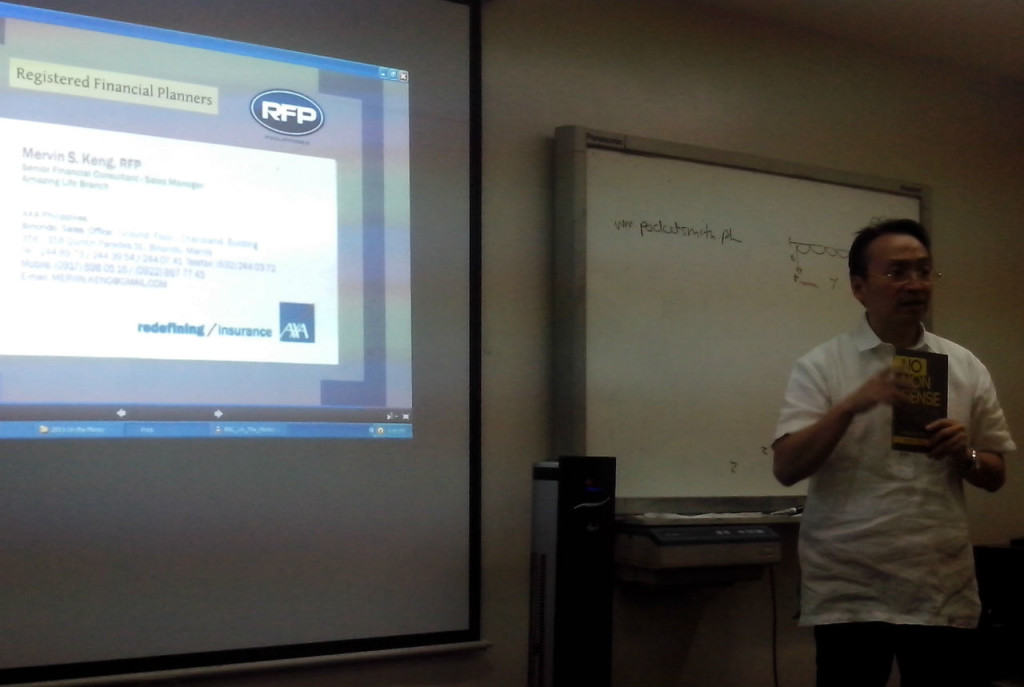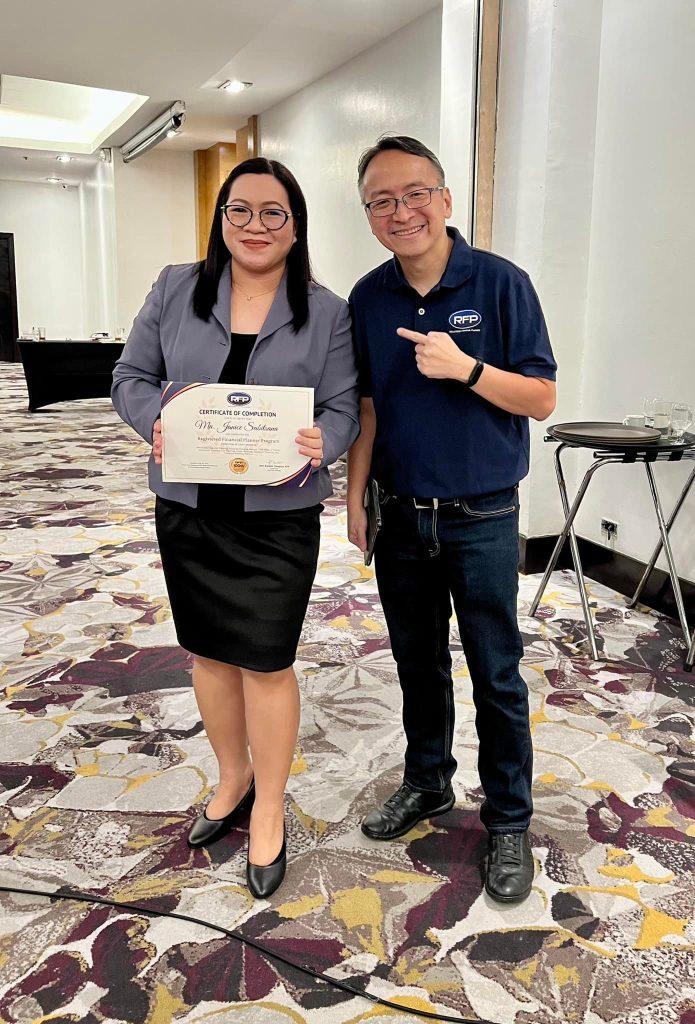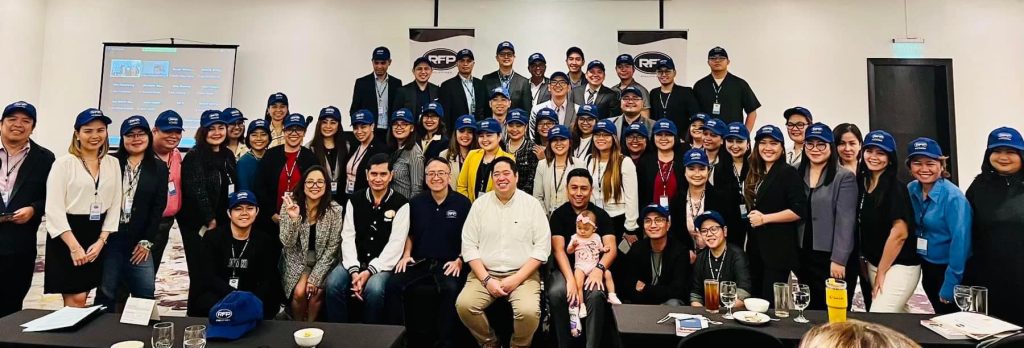Originally published: August 24, 2014
Exactly a month ago, I attended a free info session at the Registered Financial Planner (RFP) Philippines office in Ortigas.
I first learned about RFP at the Money Summit and Wealth Expo 2014 when I stumbled upon their booth.
Curious, I signed up on their guest sheet, and one of their staff members gave me a brief introduction to what RFP is all about.
Two weeks later, I received an email inviting me to their free info session. It was originally scheduled for July 17 but was moved to July 24 due to Typhoon Glenda. Without hesitation, I confirmed my attendance—I was eager to learn more.
Even before attending Money Summit, I had already heard about RFP from some of my favorite finance bloggers. But all I knew was that “RFP” was a designation that followed a person’s name, much like PhD, MD, or RN.
I wanted to dig deeper, so I made it a point to attend the session.

The Info Session Experience
I arrived at the venue and registered at 6:45 PM. The session started promptly at 7:30 PM, led by Mr. Henry Ong, the director of RFP Philippines.
Key Takeaways from the Session
One of the first things I learned was that many people struggle with financial issues—not because they planned to fail, but because they failed to plan.
Financial problems often stem from misconceptions and poor financial habits.
For instance, some believe they don’t need financial planning because they’re already earning well.
But the truth is, the more you earn, the more you need to manage your finances wisely to preserve and grow your wealth.
A perfect example? Lotto jackpot winners. Many experience a “one-time big-time” windfall, only to lose everything and even go into debt because they lack financial literacy.
Another common pitfall is waiting for a financial crisis before creating a financial plan.
Sound familiar? Many of us indulge in wants rather than needs, spending on the latest gadgets or trendy items without thinking about long-term financial consequences.
Then, when an emergency arises, we scramble to make ends meet.
Now, I’m not saying you shouldn’t reward yourself. If you can afford that new phone, luxury bag, or dream vacation without compromising your financial stability, go ahead!
But if buying something means skimping on essentials or struggling with your budget afterward, it might be worth reconsidering.
What is the RFP Program?

The Registered Financial Planner (RFP) Philippines is an independent, self-regulatory professional organization that offers education and membership in financial planning.
Their mission is to promote professionalism in the financial planning field.
The RFP Program is an 8-week course (held on consecutive Saturdays) designed for individuals who want to deepen their financial knowledge and become practitioners in personal financial planning.
It also provides networking opportunities with fellow finance professionals, enhancing both knowledge and career prospects.
After attending the session, I realized that enrolling in the RFP Program would be a great investment—not just for my own financial goals but also in my advocacy for financial literacy.
However, I had other financial priorities. As much as I wanted to join Batch 42, which started yesterday, I had to put it on hold.
Fast Forward: My RFP Journey

Updated: January 3, 2024
Years passed, but my goal of becoming a Registered Financial Planner never faded.
In 2021, I finally took the leap and enrolled in the RFP Program. It was a challenging yet fulfilling journey. After successfully completing all the requirements, I officially became a Registered Financial Planner (RFP) in February 2023.
Now, with “RFP” proudly attached to my name, I continue my mission to spread financial literacy and help others take control of their finances.
Want to know more about my RFP journey?
Check out this blog post where I share my experience from start to finish:
If you’re ready to take the next step and enroll in the Registered Financial Planner program, you can sign up here:
Are you considering becoming an RFP?
I’d love to hear your thoughts in the comments. If you have any questions about the RFP program or becoming a Registered Financial Planner, feel free to email me at janice(at)thepinayinvestor(dot)com. I’d be happy to help!


I agree with the statement “some people wait for financial crisis to happen before creating a financial plan”
– in reality we always learn a lesson first. Sometimes those lessons are expensive and or learning things in hard way.
But in the other hand we can do better in life if we have ” DEFINITE GOAL”, you have the BURNING DESIRE to TAKE ACTION to reach your “DEFINITE GOAL” (keywords, I’ve learned from the book Think and Grow Rich by Napoleon Hill)
Some other books said “SOFT SPOT” a DREAM OR GOAL. Example: someday I want to feed the street children, i really wanted to help them.
Talking about RFP- I’ve been thinking about this too. Good that you wrote and article about this. Now I have the company to talk to or inquire when I decided to be RFP.
Hi PhilippineAnswers, thanks for sharing your thoughts on this. Very well said…
Who knows, we become classmates when we pursue RFP. 🙂
It would be great if could, Jan.
28 October 2015
Hi Ms. Janice,
I hope that you have had the opportunity to become a RFP !
I just read a column in the Inquirer.net by Mr. Henry Ong and wanted to respond to him but all of my email attempts failed. Maybe you can help. This is what I wrote:
Mr. Ong,
Your response to the OFW who was wanting to save for retirement was excellent. It is great that the OFW is thinking about and will hopefully be able to save and invest some money with a retirement goal in mind.
But it is really difficult for local employees in SME’s and barely earning above minimum wage to realistically set such a lofty financial goal. They have everything working against them with respect to investing in the stock market…limited savings potential, inflation, fees (brokerage, financial planner, etc.) and taxes that would eat up their returns and more if they were able to only buy a share or two at a time. Plus, with respect to investing in the stock market, I don’t find any low cost mutual funds, ETF’s or discount brokers available to them here.
Your last paragraph is ‘right on the money’ but these are the very people who need a financial planner the most…and I am a firm believer in hiring a financial planner to help but he/she does have a ‘cost’ that cannot be ignored. The effort to learn and understand the investment process usually has a very steep and costly learning curve with inflation, banks, insurance companies, brokers, capital gains taxes, flim-flam artists and out right con-men wanting to take pesos away from the investor and give little or nothing in return.
My wife has a very small business with three young employees earning just above minimum wage. I am a foreigner and retired but my heart just breaks with the thought that these employees (1) are already barely making it from paycheck to paycheck, (2) do not see the need to save for retirement (it is not in the ‘culture’?); (3) were never given any financial education in school (but neither was I); and (4) expect that their separation pay from the last job they have or that the (5) Social Security and Pag Ibig contributions they have made will fully ‘fund’ their retirement needs.
Regarding thoughts (1) and (3) above, I’ve asked my wife’s employees to start with a simple plan of keeping track of every peso they have and spend between paychecks to find out where their money goes. Then we can look at where possible savings can come from, i.e., stop smoking!; drink water instead of a Starbucks coffee or beers on Saturday night; keep your old cell phone because it still works just fine; get the lowest cell phone load available and when it is gone, wait until the next paycheck to replenish the load; disconnect from cable tv and watch local channels; etc.
I also give them articles to read such as yours to help them understand that they must start now with regard to saving for their retirement.
Do you have any other advice that would help them realize the need to start saving early for retirement and what possible low cost, inflation beating investment vehicles are realistically available to them?
Thank you.
Regards,
Gary
28 October 2015
Hi Ms. Janice,
I just had another thought for your RFP ‘education’. I would highly recommend the following books by Ric Edelman: ‘The LIES About Money’ and ‘The TRUTH About Money’. While these books are definitely written for American investors and the opportunities available there, the overall information is excellent and gives the rational for being highly diversified in one’s investments. They also explain what to watch out for when looking at investments and what questions potential clients should ask financial planners/advisors before hiring them.
Regards,
Gary